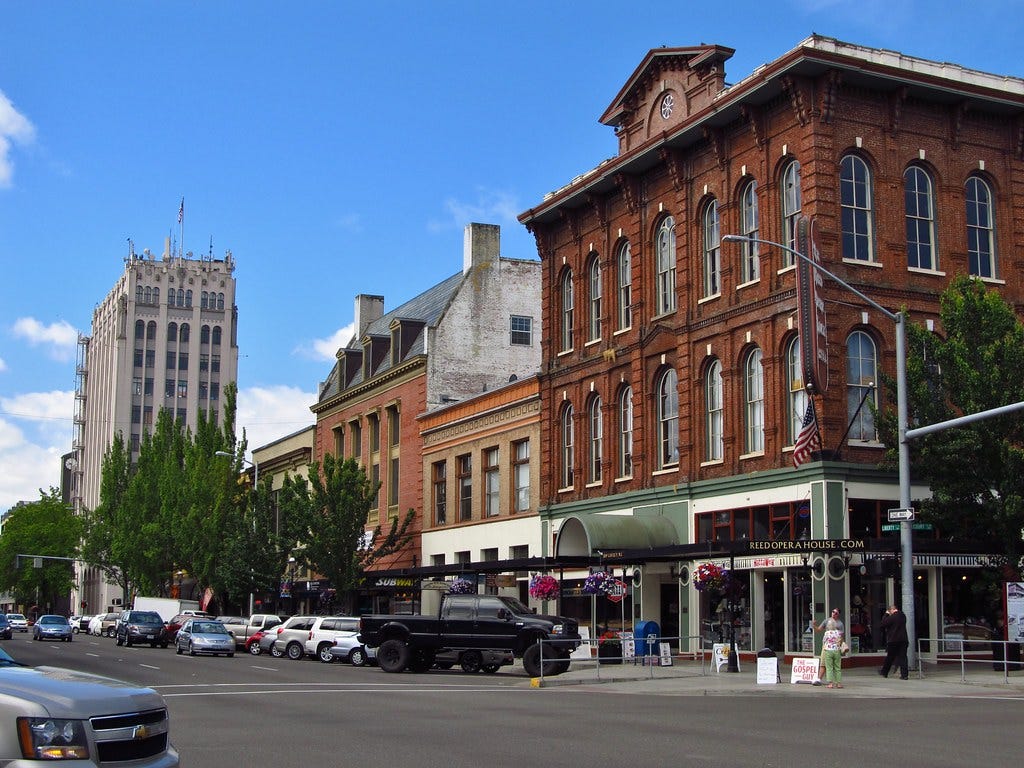The Terms in Oregon
Are the positives of life in Oregon inextricably based on the suffering of others? And, if so, what options do we have to remedy that troubling trade-off?
Adam Davis works with Oregon Humanities to get people thinking and talking together, and he used to lead backcountry trail crews with the US Forest Service.

In 1973, Ursula K. Le Guin, who had been living in Oregon for almost 15 years, published a short story called “The Ones Who Walk Away from Omelas.” Le Guin indicated in an interview that Omelas, the name of the town where the story was set, had been inspired by the sight of “Salem” on a sign in her car’s mirror. Leaving Salem, Le Guin thought to set her story in its reversed reflection.
In the story, the residents of Omelas have it good: the streets are filled with song and joy. Life is, in the snapshot Le Guin gives us, a festival. The catch in Omelas—and it’s a huge catch—is that everyone’s happiness depends on the suffering of one child, or a string of children, condemned to live in squalor and misery in a dark basement. Not only that, but all the happy residents of Omelas must, at some point in their adolescence, reckon with the existence of the suffering child. They must acknowledge that their happiness depends on that specific person’s suffering. They must look at this innocent, suffering being up close, and they must consent to this child’s suffering as the condition upon which the persistence of their happiness depends. To try and change that condition, or to alleviate the suffering of the child, is to shatter the happy regime of Omelas. Those, as the narrator of Le Guin’s story puts it, are “the terms.”
I’ve seen this story move many more people than I could count to think about the relationship between their own happiness and the suffering of others. I’ve also seen everyone who encounters the story read it allegorically: the child in the basement stands for people without homes, or people without money, or people without white skin, or any number of other groups whose suffering seems to be the condition upon which other people’s happiness depends—and a condition that these happier people are willing to accept and perpetuate.
The story holds great power when read this way, as a completely open-ended allegory. Still, I sometimes wonder what it would mean to read it just a bit more literally—and specifically to think about Le Guin having set it in a funhouse, or unfunhouse, reflection of Salem, Oregon.
Could Le Guin have had Salem, or Oregon, in mind when she described Omelas in the following way?
In the streets between houses with red roofs and painted walls, between old moss-grown gardens and under avenues of trees, past great parks and public buildings, processions moved.
And this:
I incline to think that people from towns up and down the coast have been coming in to Omelas during the last days before the Festival on very fast little trains and double-decked trams, and that the train station of Omelas is actually the handsomest building in town, though plainer than the magnificent Farmers’ Market.
And, also this:
[R]eally it would be better not to have any temples in Omelas—at least, not manned temples. Religion yes, clergy no.
And, lastly, this:
I fear that Omelas so far strikes some of you as goody-goody. Smiles, bells, parades, horses, bleh. If so, please add an orgy. If an orgy would help, don’t hesitate.
Omelas, in Le Guin’s depiction, is mossy, not too far from the coast, relatively unchurched, and comfortable with orgies (some cousin to strip clubs). Omelas could literally pass for a couple of the larger cities in Oregon.
If you’ve come this far with me, then stay just a little bit longer.
If Omelas is some version of Oregon, or some city in Oregon, then we, as Oregonians, can’t help but ask ourselves a few difficult questions. The obvious first question is the allegorical one: whose presence in Oregon’s miserable basement have we accepted as a condition of our own leafy, Oregonian happiness?
The second question is about “the terms:” How much have we accustomed ourselves to accepting that the suffering of some is indeed essential to those who would live well in Oregon? Are these really the terms?
And then there’s the question that closes Le Guin’s story, a question I want to bring home to those of us who live here: if it is the case that these simply are “the terms,” and that these terms are somehow unchangeable (which is difficult to accept but also difficult, based on the evidence all around us, to dispute), then what would it take for us to walk away? What would lead us to shed our attachment to this place and all of the joys, the festivals, that it offers?
This last question is not meant to ask when the diminution of our own pleasures leads us to go; instead, it’s meant to ask about our sense of responsibility, in this place, for the suffering of others.
Is it the case that some people’s joy in Oregon depends on the suffering of others in Oregon? If so, and if unchangeably so, then how long do we remain content to stay here rather than, like those at the end of Le Guin’s story, to walk away (even if we might not know where we’re headed)?



